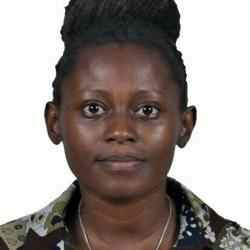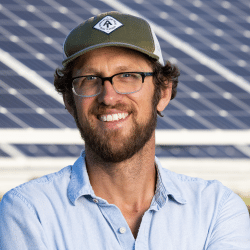Introduction
Hastings is shifting mindsets around youth unemployment in Malawi by making agriculture a viable career option through a self-perpetuating movement of farmers’ collectives, de-risking themselves and building enterprises for value addition.
The New Idea
Hastings is changing the perceptions around agriculture as a career of last resort by turning it into a lucrative career path for the youth in Malawi and beyond. Through his organization, ACADES, he is modernizing agribusiness by providing tailor-made technical advice on agriculture and the business of farming to young farmers. Some of the tools they provide include templates for record keeping basic business plans and technical assistance on various crops to support their agricultural production. This supports the youth farmers to keep their records to understand their businesses and making it a viable profession for young people and changing the perception that agriculture is “something poor people do”, “not being profitable”, “not being a full-time job”, and “a risky venture”.
Through his work at ACADES, he promotes the formation of productive groups among young smallholder farmers. By uniting these farmers, they can collectively enhance their productivity and increase their profits. ACADES then bridges the gap between farmers and a sustainable, profitable market by providing a platform where farmers can sell their produce at fair prices. This is especially crucial in the last mile, where farmers frequently face exploitation from vendors and aggregators who offer unfair prices.
Through these efforts they are making agriculture a viable choice for creating employment opportunities for rural youth. Additionally, Hastings strives to generate real economic prospects in rural areas where 80% of the population lacks access to formal employment options that can adequately support their livelihoods and food security. By providing the farmers with loans and tools for extensive record keeping they are helping young people build a credit record which helps them access credit after they graduate from the programmes offered by ACADES.
It is therefore increasing the profitability of youth-driven agribusiness, reducing the risk and making agriculture a viable option for youth employment creation. The model is structured with the intention to de-risk the youth and allow them to gain access to financing and markets. It has already made strides towards changing the perceptions of agriculture in Malawi by creating a collective of young farmers and overcoming barriers such as youth unemployment through agriculture. ACADES has developed a thriving community of small-scale farmers and enabled them to create employment for themselves and others. ACADES impact in their last financial year is remarkable: 6,900 direct beneficiaries, 2,625 new farmers trained, 64 new farmers groups organized. ACADES was recognized by the Food and Agriculture Organization (FAO) of the United Nations as having the best approaches of strengthening youth employment creation through agriculture in Africa.
While there are some programs that are aimed at addressing youth unemployment most focus on promotion of technical, vocational, and entrepreneurial activities mostly in the traditional trades (mainly construction related trades such as carpentry, plumbing, electrical installation etc.). The programs have minimal focus on agriculture as the critical sector to drive youth employment creation. There are selected few programs focusing on agriculture as one of the main sectors for youth employment creation such as the African Development Bank Jobs for Youth Program, but the programs are not comprehensive enough to ensure sustainability.
Most of the programs are mainly focusing on the provision of agriculture support services such as training, financing, and markets. They fall short in transforming the negative mindset that rural youth have towards agriculture. Consequently, most youth continue to engage in agriculture as an activity of last resort and are looking for alternatives to exit farming. Secondly the existing interventions on empowering youth in agriculture are also not focusing on de-risking youth in agriculture so that they can access support services. For instance, the existing interventions such as Jobs for Youth Program and the government extension program are focusing on providing financing for seasonal inputs, but they are not focusing on preparing youth in agriculture so that they are ready to access financing, markets, and trainings beyond that season or the program’s duration. Consequently, youth in agriculture remain risky and unattractive to most stakeholders and support service providers.
The Problem
High population growth and youth population are among the major pressing issues in Malawi and the entire African continent. Africa has a high youth population with over 60% of the population aged below 35. Malawi alone has over 75% of the population aged below 35 according to Malawi Population Census Report 2018. Africa continues to experience high population growth with the total African population expected to double to 2 billion people by 2050. The youth population is also projected to double to over 830 million by 2050 according to the African Development Bank. Similarly, the 2018 Malawi Population census report projected that the Malawi population will grow by 35% by 2028. Numerous stakeholders have highlighted that the high population growth and the growing youth population is a ticking time bomb which will result into many social economic problems if the continent and countries does not create economic and employment opportunities matching the growth rate of the youth population.
Despite this high and rapid growth in the youth population, unemployment levels are very high in Malawi and the entire African continent. According to the World Bank youth accounts for 60% of all African unemployed. Africa Development Bank highlights that most of the African youth do not have stable economic opportunities with one third of the youth population unemployed, another one third vulnerably employed and one sixth in wage employment. There is therefore an urgent need to create sustainable employment and economic opportunities for African youth in line with the rate of the population growth.
With over 70% of the African population living in rural areas, agriculture remains the main sector with untapped potential of creating sustainable economic opportunities for youth and feed the growing African population. However, despite the numerous opportunities in agriculture for youth employment creation, there is limited youth participation. On the other hand, most farmer support programs are not tailored to the needs of the youth hence they focus on the aging farming population. Dyton Chibonga from the National Smallholder Farmers Association of Malawi highlighted that the average age of a smallholder farmer in Malawi is 65. This is not sustainable, as most farmer empowerment programs are not investing in the future and the skills need to be transferred to the younger generation to ensure food security. There are two major foundation factors hindering youth from engaging in agriculture:(1) a negative mindset toward agriculture and (2) the perceived riskiness of youth in agriculture.
The majority of youth in Malawi and Africa perceive agriculture as an activity of last resort and associate it with poverty, low income, and physical hard labor. This perception is a result of different factors such as limited exposure to role models in agriculture. Most youth in Malawi live in rural areas where they have not seen a successful farmer. They have grown up seeing their parents and members of the community as farmers, most of whom have lived in poverty all their lives. Additionally, most youth are only exposed to traditional and low value food crops such as maize.
Society also discourages youth from engaging in agriculture. Most rural Malawian families and other support structures do not want their children to become farmers when they grow up but rather, they want their children to move to cities and find formal employment. It is the norm that being a farmer is not a viable career to the extent that teachers often threaten students that if they don’t work hard in school, they will become farmers. It is with this background that many young people do not want to engage in farming while few young farmers are doing farming as an activity of last resort.
In addition, young people struggle to access land or capital to start their own farming projects because they are seen as high risk by financial institutions. Some of the challenges that increase their risk include the fact that they are not organized in groups, have low financial literacy levels, do not have credit history, do not keep records, do not have savings etc. These capacity gaps make the youth risky and exclude them from accessing critical support services such as training, markets, and financing. This gap makes most players such as financial institutions and market off-takers perceive young farmers as risky stakeholders; therefore, they are unable to attract and access essential support services such as market, financing, and training.
The Strategy
Hastings invests in thousands of small-scale farmers to increase their income and create employment opportunities for people in rural areas. Hastings’s model is attracting more youth to agriculture and helping them to succeed based on addressing two main issues: (1) mindset change and (2) de-risking the youth. These core issues are tackled by a Youth-to-Youth empowerment approach, a community-led approach and a strategic partnership.
When Hastings started, he partnered with the Ministry of Youth which already had existing youth structures constituted in the villages for health promotion purposes and this was the recruitment structure for the first groups. As ACADES has grown, and news about its work and success has spread, more groups of young people approach the organization independently to join their programs. The groups are constituted of self-selected young people who then select their own leadership from among themselves. The only stipulation from ACADES is that they should have equal gender representation in the leadership structures as often the men would take on the leadership roles. The groups are structured as informal savings groups some have a bank account but others that are in more remote locations use mobile money.
The training ensures skills development of the youth farmers and covers themes around modern production, climate-smart agriculture, soil management, water management, crop management, agribusiness, and financial literacy, so that they can increase their productivity and sustain their production resources. After the training ACADES offers the groups loans in the form of inputs to get their farming endeavor going. This is important in this context, given that they are working with previously unemployed youth with little training in agribusiness. This also ensures that they have sufficient know-how to produce good yields and pay back the loans from ACADES.
To overcome the problem of access to finance, in 2022 ACADES established its own microfinancing institution wholly owned by ACADES Foundation. Through ACADES’s input financing rural small-scale farmers can access productive tools and resources necessary for them to increase their production and income. Given that the farmers ACADES works with are young and have no credit record, they provide tailor made input loans and loan products including certified seeds, fertilizers, inoculants, farming implements and irrigation equipment, allowing rural small-scale farmers to have access to high-quality inputs, productive assets, and improved technologies necessary to increase productivity and their income earnings. This reduces the “risk” and makes it easier for them to access future financing. Thus far ACADES has a loan book value of about USD 230 000, an average loan size per farmer is $46, and 6% default rate. This translates to a total number of 1625 input loans that have been granted.
To further influence the way financial institutions, fund small farmers, ACADES is part of the Malawi Micro Financing Network where they promote loan products for youth farmer collectives. They are the only institution that provides loan products to young farmers, and they hope to influence other lenders to expand their loan portfolios to include the youth, based on their success and the tools (for record keeping of their income, expenses, loan contributions and sales) they have created that can provide alternative ways to verify credit worthiness.
To bridge the lack of markets for small-scale farmers, ACADES brings ethical markets (markets who will buy at fair market prices) closer to their farmers in very rural areas, enabling them to make more money from their hard work. When farmers make more money, they are able to reinvest it in their business. ACADES has also established market centers in all their farming communities where farmers sell their produce, which enables farmers to get fair prices for their commodities ACADES has also provided international markets to its farmers. They have participated in the Intra African Trade fair hosted in Durban South Africa and the Lusaka Business Indaba in Lusaka Zambia.
The model has positioned ACADES as an organization of influence in promoting youth economic empowerment through agriculture in Malawi and Africa. Hastings is the vice president for the regional farmers body Southern Africa Confederation of Agriculture Unions. ACADES is currently in the core advisory panel for Malawi Vision 2063 and is involved in the designing of country strategy papers for bilateral organizations mainly GIZ (the German Development Corporation) and Flanders Government. This places them in a unique position to influence policy and resources targeted at supporting youth participation in agribusiness. ACADES also contributes to the core advisory panel on youth for the National Planning Commission and Gender Commission.
ACADES has now scaled to five districts in Malawi and aims to grow to all 12 rural districts in Malawi and three new countries by 2025. The growth strategy is to scale the idea to other countries through partnerships. The demand for learning visits has been on the increase, especially since the validation from FAO as the best model to create opportunities for youth in agriculture. Thus far Hastings has hosted learning visits for organizations from Kenya, Tanzania, Uganda, South Africa and Zambia. The learning visits focus on sharing the model and how it can be adapted to other African countries.
The Person
From an early age Hastings learnt the power of speaking truth to power and negotiation to navigate trauma at home. From about the age of 10 he realized his leadership power as he saw that he could negotiate and speak truth to his father as the eldest child, and at this moment it was clear to him that he could make a difference in other people’s lives. While growing up, Hastings wanted to be a teacher as these were the well-to-do people in his community. His attitude towards farming was that it was a career of last resort as many of the farmers he had seen growing up were struggling and often barely made ends meet.
After graduating from high school, he wanted to study engineering but was not granted his first choice and ended up studying agriculture at the Lilongwe University of Agriculture and Natural Resources. He was determined to change his degree in the first year but as he started gaining a better understanding of agribusiness, he grew to love agriculture. While he was studying, he was an active student leader and one talk he attended challenged him to reflect on how he could lead the change he wanted to see in agriculture. When he graduated, he decided he was going to try his hand at commercial agriculture. His first attempt was to grow onions which were being imported from South Africa and when his uncle saw he was starting to make a success of it they took the land from him. This did not deter him. He set out to make a case with the Ministry of Agriculture that they should be allocating young agriculture graduates land so they can farm. After being persistent for many months they allocated him 100 ha of virgin land. The land was difficult to work in and they tried to get support from over 12 institutions to assist them, but many expressed that they were young and therefore very risky to invest in.
This was the beginning of experiencing and innovating the obstacles young people face. He demonstrated a lot of grit as he did not just fold his hands but continued to find ways to pursue his dream. After graduating from the university, professors gave him 6 ha of land, and this set him on a successful path that led to the birth of ACADES. In 2020 he was elected as a fellow under the Africa Visionary Fellowship run by the Segal Family Foundation.



